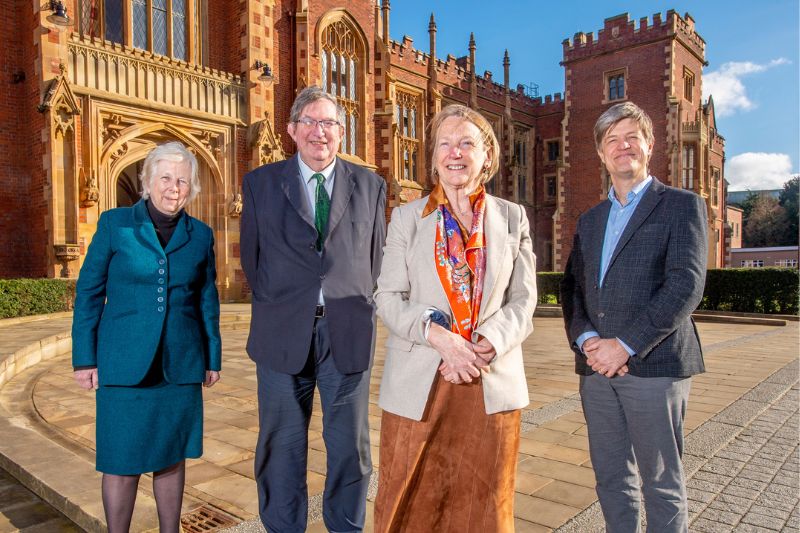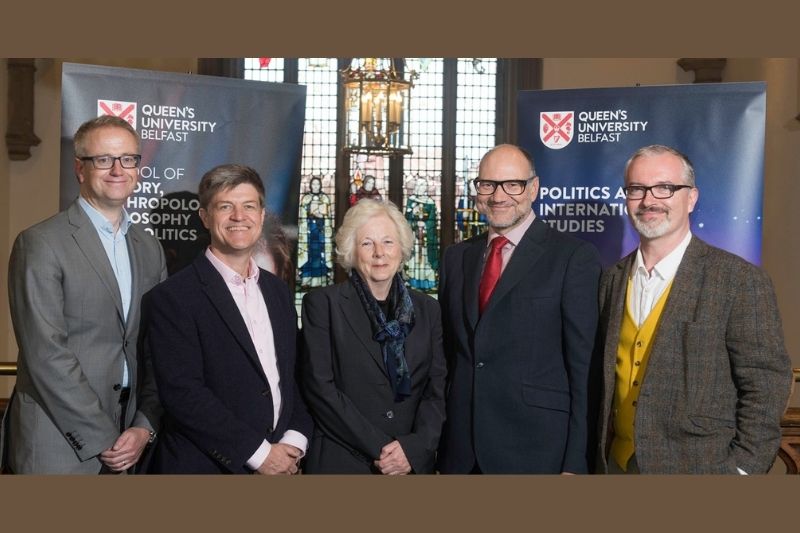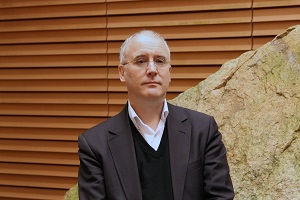Frank Wright Memorial Lecture
Professor Frank Wright
Professor Frank Wright lectured in Politics at Queen's University Belfast from 1973 until his untimely death in February 1993, at which point he had just been seconded to the University of Limerick as their first Professor of Peace Studies. His work has been hugely influential. Northern Ireland: a comparative analysis, explored the Northern Ireland conflict through parallels with other societies divided along ethnic lines, while his important book Two Lands on One Soil, published posthumously in 1994, brought an important longer historical perspective to the Northern Ireland conflict. His work was marked by intellectual rigour and a deep empathy for the subjects of his research.

Politics & International Relations hosted the annual Frank Wright Memorial Lecture on Thursday 1 May 2025 in Queen's University Belfast by Professor Seth Schlinder, University of Manchester.
Lecture recording available here
Professor Seth Schindler trained as an urban geographer. He focuses on the politics surrounding large-scale urban and regional transformation initiatives that integrate cities into transnational territorial and economic systems. He was the Co-Director of Research for the African Cities Research Consortium, and he is the Co-Founder of the Second Cold War Observatory (SCWO). In collaboration with colleagues at the SCWO, he has published a series of articles that examine contemporary geopolitical rivalry, and evaluate its impact on people and places worldwide. He previously coordinated the Global Studies Programme at the Humboldt University of Berlin. His research has appeared in leading academic journals such as Geopolitics, International Journal of Urban and Regional Research, and Regional Studies.

Politics & International Relations hosted the annual Frank Wright Memorial Lecture on Thursday 9 May 2024 in Queen's University Belfast by Professor Melani Cammett, Harvard University.
Melani Cammett is Clarence Dillon Professor of International Affairs in the Government Department and Director of the Weatherhead Center for International Affairs at Harvard University. Cammett's books include The Oxford Handbook on Politics in Muslim Societies (co-edited with Pauline Jones, Oxford University Press, 2022), Compassionate Communalism: Welfare and Sectarianism in Lebanon (Cornell University Press 2014), which won the American Political Science Association (APSA) Giovanni Sartori Book Award and the Honorable Mention for the APSA Gregory Luebbert Book Award; A Political Economy of the Middle East (co-authored with Ishac Diwan, Alan Richards, and John Waterbury, 2015); The Politics of Non-State Social Welfare in the Global South (co-edited with Lauren Morris MacLean, Cornell University Press 2014), which received the Honorable Mention for the ARNOVA book award; and Globalization and Business Politics in North Africa (Cambridge University Press 2007, 2010).
Her research explores identity politics, development, migration, and authoritarianism in the Middle East and other contexts and has been published in leading peer-reviewed journals and other outlets. She is currently working on a book that explores how people live together after violence, focusing on Bosnia-Herzegovina, Lebanon, and Northern Ireland.

Politics & International Relations hosted the annual Frank Wright Memorial Lecture on Thursday 4 May 2023 in Queen's University Belfast by Professor Roger Mac Ginty, Durham University.
"Getting on with it: How contention and co-existence operate side-by-side in deeply-divided societies".
Roger Mac Ginty is Professor in Defence, Development and Diplomacy in the School of Government and International Affairs at Durham University. He works on peace and conflict, particularly on the intersection between top-down and bottom-up approaches to peacemaking. He is interested in everyday peace and the different ways in which this might be captured. He has conducted extensive fieldwork and his research has been funded by the EU, ESRC and Carnegie Corporation of New York among others. He co-directs the Everyday Peace Indicators project (with Pamina Firchow) and edits the Taylor and Francis journal Peacebuilding (with Oliver Richmond). He also edits the "Rethinking Political Violence" book series. His articles have been published in Cooperation and Conflict, Security Dialogue, and Review of International Studies. His most recent book, Everyday Peace: How so-called ordinary people can disrupt violent conflict, is published with Oxford University Press.

Politics & International Relations hosted the annual Frank Wright Memorial Lecture, delivered this year on Thursday 10 March 2022 in Queen's University Belfast by Professor Jennifer Todd (UCD).
“Ethnic Conflict: Comparative Logics, Prospects of Transformation”
Lecture recording available here
Jennifer Todd is Emeritus (Full) Professor, School of Politics and International Relations, UCD; Research Director, Institute for British-Irish Studies, UCD (previously Director); a Fellow at the Geary Institute for Public Policy, UCD and associate Fellow at the Centre on Constitutional Change U Edinburgh. She is a member of the Royal Irish Academy, ‘considered the highest academic honour in Ireland’ since 2007. She gained her degrees in philosophy from University of Kent at Canterbury (BA) and Boston University (PhD). The focus of her work, from early analyses of aesthetics and politics to current work on conflict and settlement, state change and identity shift, has been on the interrelation of socio-economic and political processes and processes of cultural change.
Photo L-R:
Professor Emeritus Clare Fowler (UCL), Professor Emeritus Adrian Guelke (Chair), Professor Jennifer Todd (UCD) and Dr Stefan Andreasson (Disciplinary Lead, Politics & IR).

The 2021 Frank Wright Memorial Lecture was delivered by Professor Cécile Fabre, Professor of Political Philosophy, All Souls College, University of Oxford on Friday 5 February 2021
“Snatching Something From Death" Value, Justice, and Humankind’s Common Heritage.

The 2019 Frank Wright Memorial Lecture was delivered by Professor Stathis Kalyvas in the Council Chamber, Queen's University Belfast on 11 October 2019.
Professor Kalyvas is Gladstone Professor of Government at the Department of Politics and International Relations at the University of Oxford and Fellow of All Souls College. His research focuses on global trends in civil conflict and political violence, and the history and politics of Greece.
He is the author of The Rise of Christian Democracy in Europe (Cornell University Press, 1996), The Logic of Violence in Civil War (Cambridge University Press, 2006), Modern Greece: What Everyone Needs to Know (Oxford University Press, 2015), the co-editor of Order, Conflict, and Violence (Cambridge University Press, 2008) and the Oxford Handbook on Terrorism (Oxford University Press, 2019). Professor Kalyvas is also the author of over fifty scholarly articles in five languages, as well as several books and edited volumes in Greek.
Photo L-R:
Professor Alister Miskimmon, Head of the School of History, Anthropology, Philosophy and Politics; Dr Stefan Andreasson, Senior Lecturer in Politics from the School of History, Anthropology, Philosophy and Politics; Professor Clare Fowler, sister of Professor Frank Wright; Professor Stathis Kalyvas, Gladstone Professor of Government from the University of Oxford and Fellow of All Souls College; and Professor Richard English, Pro-Vice-Chancellor for Internationalisation and Engagement.

The 2018 Frank Wright Memorial Lecture was delivered by Professor David Armitage, in the Emeleus Lecture Theatre, Queen's University Belfast on 29 November 2018.
Professor David Armitage is Lloyd C. Blankfein Professor of History at Harvard University, author of many key works including, most recently, Civil Wars: a history in ideas, and Honorary Professor of Queen’s University Belfast.
The fraught and contentious process of the United Kingdom’s exit from the European Union (Brexit) has dominated political debate like no other issue since the Suez Crisis, if not before. Questions of popular will, parliamentary sovereignty, the balance between political autonomy and political economy, Britain’s role in the world and the future of the union, most pointedly around the nature of the border across the island of Ireland, have dominated recent discussion. However, Brexit is at root and in the end a treaty negotiation, the result of Teresa May’s invocation of the provision of one treaty (article 50 of the Treaty of Lisbon) in order to negotiate a new treaty, for the UK’s de-accession or “divorce” from the EU. In this lecture, I will argue that, seen from a long-range historical perspective, Brexit and the debate around it is but one moment in the history of what I will call “treaty consciousness”—the public apprehension of the significance of treaties in such matters as the shaping of internal politics and the determination of international status. The lecture traces the rise and fall and rise again of treaty consciousness in global context from the early modern period to the present, in order to shed light on contemporary transformations in the international order, Brexit among them.
